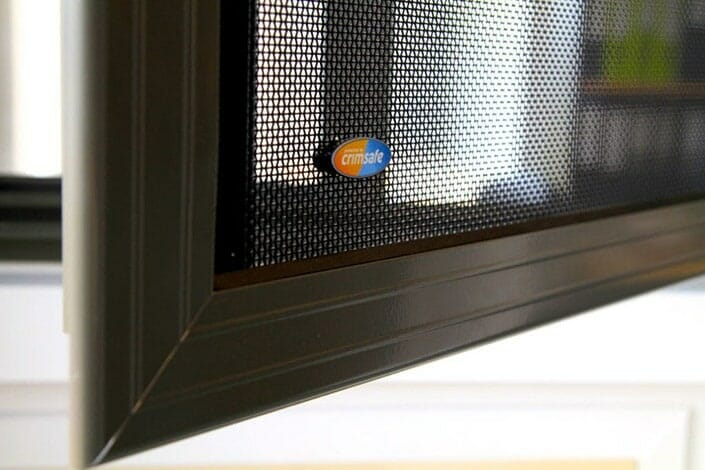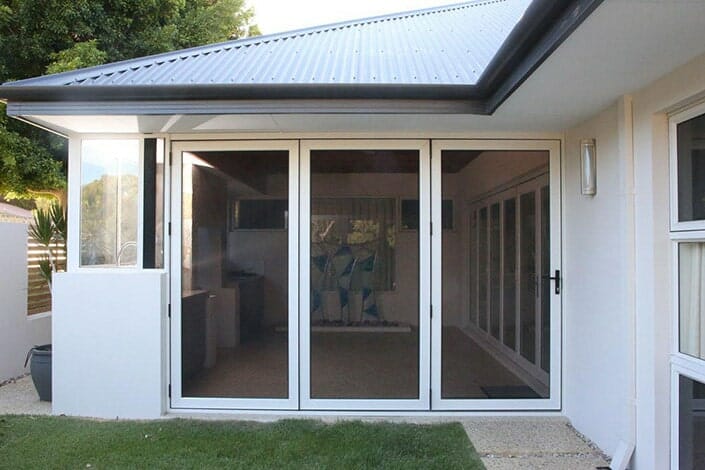Choosing the right quality security door or screen can be as daunting as most large purchases. When you get a security door, you are within your rights to expect that it will last a long time.
Rusty or corroded security installations not only look bad but are also compromised in strength. So, it’s important to pick both a product with a protective layer and an installer that will go the distance.
Here we outline how corrosion can affect your security door and how to choose, and care for, the best product for your situation.
Security Door Aluminium Corrosion Explained
Aluminium is a widely used material in the construction of security doors due to its durability, strength, and lightness. However, like any other active metal, it is subject to a process known as corrosion, which can be understood as a chemical reaction between the metal and its surrounding environment.
Aluminium’s corrosion occurs when it reacts with oxygen to form aluminium oxide. This chemical reaction creates a protective film on the surface of the aluminium that helps protect it from further corrosion. This film is resistant to many corrosive materials and can self-repair if damaged, making aluminium a very resilient material. This is a form of corrosion protection, making aluminium more robust than many other metals that do not have this inherent self-protecting property.
Nevertheless, in certain circumstances, if the aluminium comes into contact with a more active metal and they are both in the presence of an electrolyte (like water with salt), galvanic corrosion can occur. This is due to the electrical potential difference between the metals, with the more active metal acting as an anode (corroding) and the less active metal as a cathode.
To reduce corrosion, particularly in coastal areas where salty air can act as an electrolyte, aluminium security doors can be treated with special coatings. These coatings provide an additional barrier to the surrounding environment, further enhancing the material’s corrosion protection.
Around 80% of Australia’s population lives on or near the coast, and corrosion from a salt spray can be a real problem for a metal security door. Salt will corrode not only metal, but also concrete, tiles, bricks, mortar, and wood which can cause structural problems.
Another potential cause of metal surface corrosion is galvanic corrosion. This kind of corrosion process occurs when two dissimilar metals corrode by coming in direct contact either directly or through a conductive substance such as moisture or grime, which can build up around the perimeter of mesh security doors.
If the direct contact between the two metals is prevented by quality beading and seals such as the ones used in Crimsafe products, and the product is kept free from grime or salt build up then there cannot be galvanic corrosion.
Although aluminium as an active metal does react with its surrounding environment, the chemical reaction often forms a protective film that provides corrosion protection. However, under specific circumstances, further measures may need to be taken to reduce corrosion.

How are Security Doors and Windows Manufactured?
Preventing corrosion is a crucial point; it’s where most manufacturers will spend their money if the door is made right. When purchasing a steel and aluminium door, the most common method for further protection is Powder Coating the security door.
Crimsafe uses only the toughest materials: 0.9mm diameter, 304-grade structural grade stainless steel wire with high-grade pre-treatment and high durability powder coat technologies are applied to protect the finished product so it will not rust.
Crimsafe is the only security screen product in Australia where the mesh is screwed into the frame, using tamper-resistant stainless-steel screws, and clamped down with a patented device called the “Screw-Clamp™.”
You can customise your frame with just about any colour you can think of. Clearview Security works with the largest global manufacturer of protective coatings so you can be sure to find the perfect colour solution to match your space.

Durability of Crimsafe Products
Crimsafe products are amongst the most durable security screens and doors on the market. Despite their ability to withstand force and environmental wear and tear, all mesh traps dirt and impurities from the air, giving it a worn appearance over time. Salt, moisture, and airborne impurities can all lead to staining of the mesh coating, reddish marks, or white salt build-up.
There is a huge range of security screens on the market, but if you’re looking at installing security screens in your home, you’ll find that Crimsafe doors from Clearview Security tick all boxes:
- Crimsafe easily exceeds the Australian Standards required to protect your family and help keep intruders out.
- Reduces solar heat gain by 53% and blocks 62% of harmful UV rays from entering your home.
- Crimsafe security screens can be used for the highest level of bushfire protection (BAL-FZ).
- All Crimsafe products can withstand the 3,000-hour test of alternating salt spray and dry cycles, equivalent to 30 years of environmental exposure.
- ]Security screens keep insects, pests, and intruders out of your home, while still giving you maximum airflow.
A good warranty usually speaks volumes as to whether a company backs their product. Crimsafe offers three ranges of security doors; Regular, Classic and Ultimate – each of which come with a 12-15 Year Warranty.
Security Door Installation
Remember, doors can vary in size, so all our security screen doors are custom-made to size. They are available in a range of styles and colours to suit any home or business premises and are able to have many effective corrosion prevention methods applied to them.
A great security screen stands up to the elements and keeps your home looking good for years, and Crimsafe security screens from Clearview Security are the best that you can get.
Caring for your Security Door
Since all screens trap dirt and impurities over time, it is important to wash your security products regularly to avoid staining and remove build-up. Keeping your security screens clean prevents the build-up of dirt, grime, and salt, lessening the likelihood of corrosion.
Regular maintenance depends on your environment; for most it involves a wash down of frames and mesh with warm water using a soft non-abrasive brush to dislodge dirt and grime, followed by a wipe down. You can also use products such as corrosion inhibitors to provide a protective coating that can better prevent corrosion. Learn more about how to care for your Crimsafe products.
| Environment | Distance | Time Interval |
| Mild | 10km+ from beachfront | Every 6 months |
| Moderate | 1-10 km from beachfront | 2 to 3 months |
| High | 500m-1 km from beachfront | 2 to 4 weeks |
| Severe | Under 500m of beachfront | 1 to 2 weeks |
Final Word
If you are in doubt about which option to choose based on your situation – or are looking for some additional corrosion protection on your security products, ask an expert from Clearview Security today!



